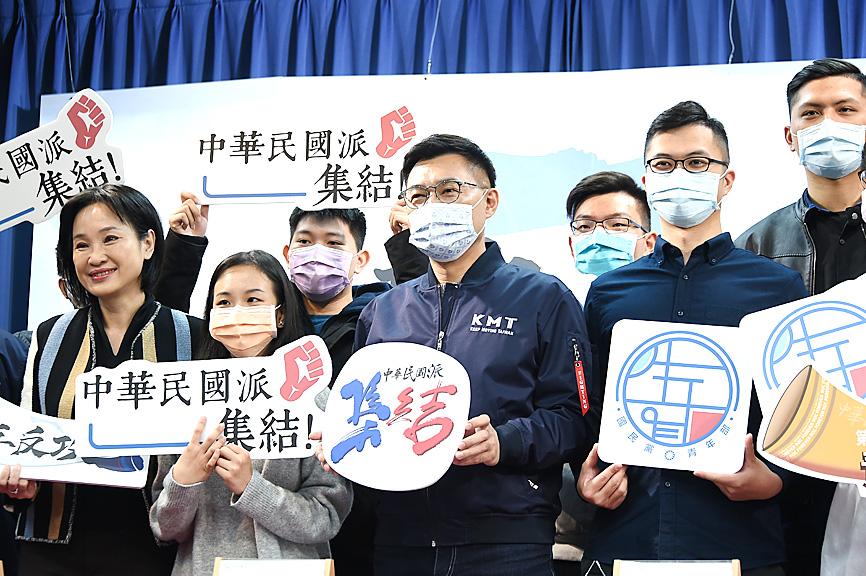The Chinese Nationalist Party (KMT) must actively enlist the support of young voters if it is to win the elections next year or in 2024, KMT Chairman Johnny Chiang (江啟臣) said yesterday as the party announced a series of youth programs.
In the presidential and legislative elections on Jan. 11 last year, the KMT received about 2 million to 3 million fewer votes than the Democratic Progressive Party from voters under 40, Chiang told a news conference in Taipei, citing data.
“This is a huge gap,” said Chiang, who was elected party chairman in a by-election on March 7 last year to replace former KMT chairman Wu Den-yih (吳敦義).

Photo: Tu Chien-jung, Taipei Times
If the KMT is to return to power, whether in the local elections next year or the general elections in 2024, it must work to gain the support of young people, Chiang said.
After a year of youth-related activities, the KMT has seen some gains, although there is still work to be done, he said.
More than 3,500 people under 40 have registered to become members of the KMT in the past year, he said.
In the lead-up to last year’s chairperson by-election, there were only about 9,000 official members under the age of 40, he said.
Polls have shown a “significant” increase over the past year in the approval rating of the party among young respondents, he added.
“From national policies to municipal issues, we hope to bring the voices of young people into the KMT and promote dialogue” with them, Chiang said.
The KMT would “welcome with open arms” young talent who are willing to take part in public and party affairs, he said.
The KMT Department of Youth Affairs is to host two-day camps in different parts of the nation over several weekends, the department said.
The first session is to take place in Taipei on March 20 and 21, and would focus on housing justice, it said, adding that 30 people are expected to attend.
Other sessions would focus on areas including culture, the environment, agriculture, labor rights and tourism, it said, adding that each session would feature collaborations with different non-governmental organizations.

Taiwan is to commence mass production of the Tien Kung (天弓, “Sky Bow”) III, IV and V missiles by the second quarter of this year if the legislature approves the government’s NT$1.25 trillion (US$39.78 billion) special defense budget, an official said yesterday. Commenting on condition of anonymity, a defense official with knowledge of the matter said that the advanced systems are expected to provide crucial capabilities against ballistic and cruise missiles for the proposed “T-Dome,” an advanced, multi-layered air defense network. The Tien Kung III is an air defense missile with a maximum interception altitude of 35km. The Tien Kung IV and V

The disruption of 941 flights in and out of Taiwan due to China’s large-scale military exercises was no accident, but rather the result of a “quasi-blockade” used to simulate creating the air and sea routes needed for an amphibious landing, a military expert said. The disruptions occurred on Tuesday and lasted about 10 hours as China conducted live-fire drills in the Taiwan Strait. The Civil Aviation Administration (CAA) said the exercises affected 857 international flights and 84 domestic flights, affecting more than 100,000 travelers. Su Tzu-yun (蘇紫雲), a research fellow at the government-sponsored Institute for National Defense and Security Research, said the air

A strong continental cold air mass is to bring pollutants to Taiwan from tomorrow, the Ministry of Environment said today, as it issued an “orange” air quality alert for most of the country. All of Taiwan except for Hualien and Taitung counties is to be under an “orange” air quality alert tomorrow, indicating air quality that is unhealthy for sensitive groups. In China, areas from Shandong to Shanghai have been enveloped in haze since Saturday, the ministry said in a news release. Yesterday, hourly concentrations of PM2.5 in these areas ranged from 65 to 160 micrograms per cubic meter (mg/m³), and pollutants were

Taiwan’s armed forces have established response protocols for a wide range of sudden contingencies, including the “Wan Chun Plan” to protect the head of state, the Ministry of Defense (MND) said today. After US President Donald Trump on Saturday launched a series of airstrikes in Venezuela and kidnapped Venezuelan President Nicolas Maduro, concerns have been raised as to whether China would launch a similar “decapitation strike” on Taiwan. The armed forces regularly coordinate with relevant agencies and practice drills to ensure preparedness for a wide range of scenarios, Vice Minister of National Defense Hsu Szu-chien (徐斯儉) told reporters before a